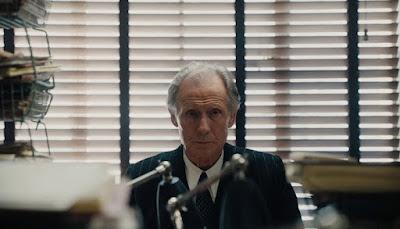Format: Streaming video from NetFlix on various players.

Of all of the Oscar nominations, aside from the Avatar sequel, none worried me as much as Living. The original Kurosawa film, Ikiru, is a masterpiece, and I’m always leery about watching a remake of a film that is genuinely one of the best films of its decade, of its genre, and of its national cinema. Ikiru is a beautiful story, tragic and sad but hopeful and uplifting at the same time. It’s a remarkable piece of work, and don’t know that it can be improved upon. And yet, here we are.
What I’ve discovered here is that Living, while very clearly based on the same story as Kurosawa’s film, is also a very different take on that story. The skeleton of the story is exactly the same, as are many of the details. It is, ultimately, a very good remake of the base story. I remember some of Ikiru quite differently than this, especially toward the end, but no matter.
We are initially introduced to Peter Wakeling (Alex Sharp) on his way to his first day at work at a government agency in post-war London. He meets up with his coworkers on the train, and on the way in, he is somewhat warned about their boss, Mr. Williams (Billy Nighy). Mr. Williams has been a bureaucrat his entire career and excels and moving paperwork from one office to another, finally holding onto projects to let them die, and never really accomplishing much of anything. It is into this world that we are thrust, along with the presence of a trio of women who want to get a bombed-out site developed into a children’s playground. The women, we soon learn, have been sent ‘round and ‘round through the building from one office to another in a fruitless quest to find someone to listen to them.
Around this same time, Mr. Williams discovers that he is dying of cancer, and his doctor has given him no more than nine months to live. He considers suicide, but ends up giving the sleeping pills he purchased to an insomniac author (Tom Burke), who then takes them both out for a night on the town, where Williams comes more to terms with what is happening to him. He plays hooky from work for a while, spending a great deal of time in the company of Margaret Harris (Aimee Lou Wood), a former colleague who has left the bureaucracy and started working in a restaurant instead. Eventually, Williams goes back to work and decides that as his life ebbs away and he finds himself unable to even tell his son about his impending death, he will do what he can to get the park for the children created.
This really is the entire movie. Williams lives such a life of quiet desperation that he can’t tell his son about his own illness for fear of how the topic might be addressed. Everyone in the film feels stiflingly repressed in all ways. No one uses anyone else’s first name aside from once or twice, and every conversation ends up being much longer than it needs to be because no one will come out and say what they intend or even what topic they want to talk about. Everyone is so worried about giving any possible offense that Williams can’t manage to tell his own son (Barney Fishwick) that he is dying, and his son is unable to confront his father about the potential scandal of spending time with Miss Harris.
I like all of the choices that have been made for Living. From the very start, there is a real sense of wanting this to look like a film from the 1950s. The titles, the entire presentation, screams that this is a film that is not merely set in the post-war years, but that it was made there as well. The music choices are impeccable throughout. It’s a lovely production.
Bill Nighy’s performance is the reason that I watched this, and he does not disappoint. Nighy is generally good to great in all of his films, but in this one, he has found a role that he can dive into and really inhabit. His supporting cast is good, but this is absolutely Nighy’s film.
I’ve heard someone say that no one should be allowed to remake a great film. Leave the original where it is, and instead, remake terrible movies and try to improve them. With a terrible story, there is the hope that you can tell it better or more coherently. That’s not a worry here, and that is my biggest concern—because the original Ikiru is still around, Living feels in part a bit…unnecessary.
Why to watch Living: It’s a still lovely and quite story.
Why not to watch: The Kurosawa is still better.
